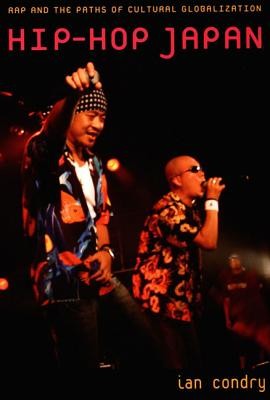
- We will send in 10–14 business days.
- Author: Ian Condry
- Publisher: Duke University Press
- ISBN-10: 0822338920
- ISBN-13: 9780822338925
- Format: 15.7 x 23.7 x 1.6 cm, softcover
- Language: English
- SAVE -10% with code: EXTRA
Reviews
Description
In this lively ethnography Ian Condry interprets Japan's vibrant hip-hop scene, explaining how a music and culture that originated halfway around the world is appropriated and remade in Tokyo clubs and recording studios. Illuminating different aspects of Japanese hip-hop, Condry chronicles how self-described "yellow B-Boys" express their devotion to "black culture," how they combine the figure of the samurai with American rapping techniques and gangsta imagery, and how underground artists compete with pop icons to define "real" Japanese hip-hop. He discusses how rappers manipulate the Japanese language to achieve rhyme and rhythmic flow and how Japan's female rappers struggle to find a place in a male-dominated genre. Condry pays particular attention to the messages of emcees, considering how their raps take on subjects including Japan's education system, its sex industry, teenage bullying victims turned schoolyard murderers, and even America's handling of the war on terror.
Condry attended more than 120 hip-hop performances in clubs in and around Tokyo, sat in on dozens of studio recording sessions, and interviewed rappers, music company executives, music store owners, and journalists. Situating the voices of Japanese artists in the specific nightclubs where hip-hop is performed-what musicians and fans call the genba (actual site) of the scene-he draws attention to the collaborative, improvisatory character of cultural globalization. He contends that it was the pull of grassroots connections and individual performers rather than the push of big media corporations that initially energized and popularized hip-hop in Japan. Zeebra, DJ Krush, Crazy-A, Rhymester, and a host of other artists created Japanese rap, one performance at a time.
EXTRA 10 % discount with code: EXTRA
The promotion ends in 16d.17:39:02
The discount code is valid when purchasing from 10 €. Discounts do not stack.
- Author: Ian Condry
- Publisher: Duke University Press
- ISBN-10: 0822338920
- ISBN-13: 9780822338925
- Format: 15.7 x 23.7 x 1.6 cm, softcover
- Language: English English
In this lively ethnography Ian Condry interprets Japan's vibrant hip-hop scene, explaining how a music and culture that originated halfway around the world is appropriated and remade in Tokyo clubs and recording studios. Illuminating different aspects of Japanese hip-hop, Condry chronicles how self-described "yellow B-Boys" express their devotion to "black culture," how they combine the figure of the samurai with American rapping techniques and gangsta imagery, and how underground artists compete with pop icons to define "real" Japanese hip-hop. He discusses how rappers manipulate the Japanese language to achieve rhyme and rhythmic flow and how Japan's female rappers struggle to find a place in a male-dominated genre. Condry pays particular attention to the messages of emcees, considering how their raps take on subjects including Japan's education system, its sex industry, teenage bullying victims turned schoolyard murderers, and even America's handling of the war on terror.
Condry attended more than 120 hip-hop performances in clubs in and around Tokyo, sat in on dozens of studio recording sessions, and interviewed rappers, music company executives, music store owners, and journalists. Situating the voices of Japanese artists in the specific nightclubs where hip-hop is performed-what musicians and fans call the genba (actual site) of the scene-he draws attention to the collaborative, improvisatory character of cultural globalization. He contends that it was the pull of grassroots connections and individual performers rather than the push of big media corporations that initially energized and popularized hip-hop in Japan. Zeebra, DJ Krush, Crazy-A, Rhymester, and a host of other artists created Japanese rap, one performance at a time.


Reviews